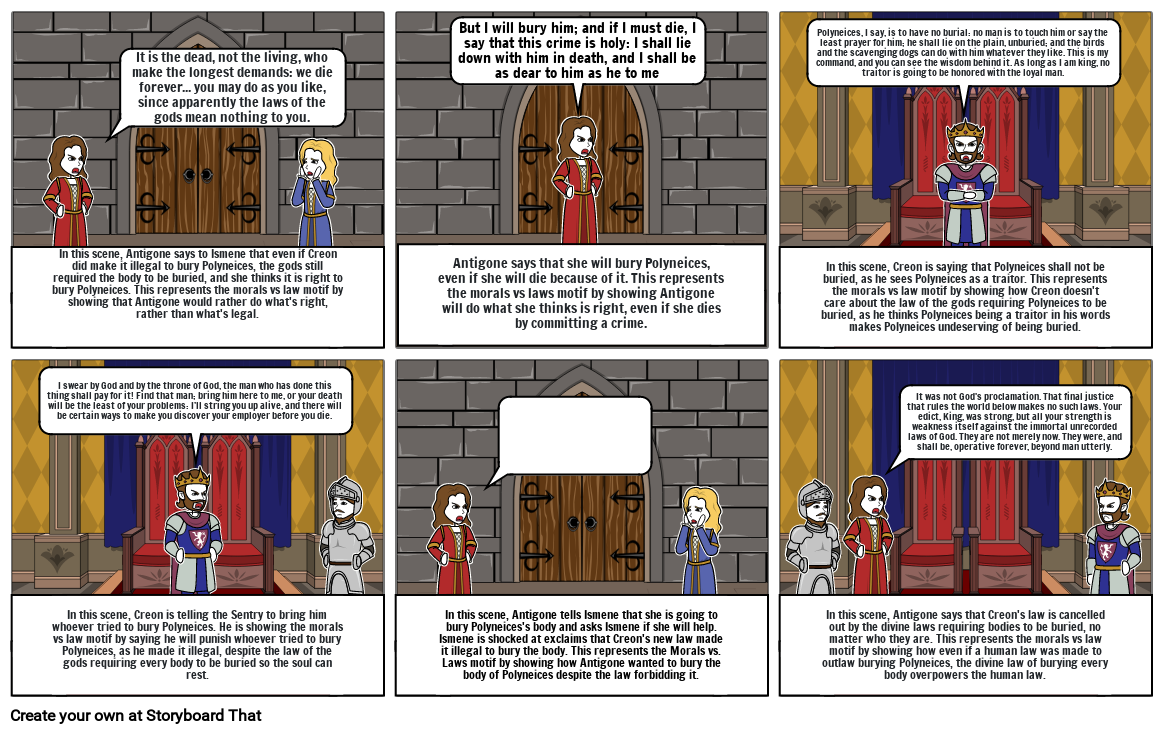Antigone Storyboard

Storyboard Tekst
- In this scene, Antigone says to Ismene that even if Creon did make it illegal to bury Polyneices, the gods still required the body to be buried, and she thinks it is right to bury Polyneices. This represents the morals vs law motif by showing that Antigone would rather do what's right, rather than what's legal.
- It is the dead, not the living, who make the longest demands: we die forever... you may do as you like, since apparently the laws of the gods mean nothing to you.
- Antigone says that she will bury Polyneices, even if she will die because of it. This represents the morals vs laws motif by showing Antigone will do what she thinks is right, even if she dies by committing a crime.
- But I will bury him; and if I must die, I say that this crime is holy: I shall lie down with him in death, and I shall be as dear to him as he to me
- In this scene, Creon is saying that Polyneices shall not be buried, as he sees Polyneices as a traitor. This represents the morals vs law motif by showing how Creon doesn't care about the law of the gods requiring Polyneices to be buried, as he thinks Polyneices being a traitor in his words makes Polyneices undeserving of being buried.
- Polyneices, I say, is to have no burial: no man is to touch him or say the least prayer for him; he shall lie on the plain, unburied; and the birds and the scavenging dogs can do with him whatever they like. This is my command, and you can see the wisdom behind it. As long as I am king, no traitor is going to be honored with the loyal man.
- In this scene, Creon is telling the Sentry to bring him whoever tried to bury Polyneices. He is showing the morals vs law motif by saying he will punish whoever tried to bury Polyneices, as he made it illegal, despite the law of the gods requiring every body to be buried so the soul can rest.
- I swear by God and by the throne of God, the man who has done this thing shall pay for it! Find that man; bring him here to me, or your death will be the least of your problems: I’ll string you up alive, and there will be certain ways to make you discover your employer before you die.
- In this scene, Antigone tells Ismene that she is going to bury Polyneices's body and asks Ismene if she will help. Ismene is shocked at exclaims that Creon's new law made it illegal to bury the body. This represents the Morals vs. Laws motif by showing how Antigone wanted to bury the body of Polyneices despite the law forbidding it.
- Ismene, I am going to bury him. Will you come?
- In this scene, Antigone says that Creon's law is cancelled out by the divine laws requiring bodies to be buried, no matter who they are. This represents the morals vs law motif by showing how even if a human law was made to outlaw burying Polyneices, the divine law of burying every body overpowers the human law.
- It was not God's proclamation. That final justice that rules the world below makes no such laws. Your edict, King, was strong, but all your strength is weakness itself against the immortal unrecorded laws of God. They are not merely now. They were, and shall be, operative forever, beyond man utterly.
Meer dan 30 miljoen storyboards gemaakt

